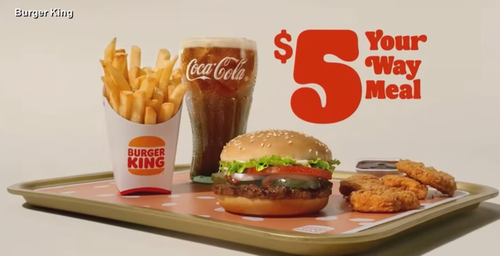
A recent trend of mega corporations rolling back prices and reintroducing deals has emerged. Whether this is potentially due to pressure from the White House ahead of elections or, as Goldman pointed out, "Consumer caution mounts as cracks in resilience theme emerge," there's growing evidence that working poor consumers are struggling in the era of failed Bidenomics.
About two weeks ago, after three years of 'McFlation' that sent the price of combo meals as high as $18, McDonald's weighed on new plans to reintroduce $5 combo meal deals. The report, initially from Bloomberg, specified the deal could include a McChicken or a McDouble, fries, and a drink.
Elsewhere, Walmart, Target, and Aldi have lowered prices on thousands of everyday items, including staple foods. This comes in response to a spending slowdown among cash-strapped working-poor consumers who are drowning in insurmountable credit card debt and drained personal savings amid elevated inflation.
Covering the faltering consumer theme have been the analysts at Goldman:
- The Largest US Trading Desk Is "Getting Bearish On The US Consumer"
- Goldman Warns Consumers Are Cracking As Stagflation Threats Emerge
- Goldman's Commentary On Consumer Health Is An Ominous One
The value war kicked off earlier this month as corporations strive to retain their customer base and prevent trade-downs or migrations to competitors. This is why McDonald's meal deal push has prompted Burger King to offer a similar deal.
Bloomberg reported that Burger King is preparing to launch a $5 meal deal. The deal will include the choice of one of three sandwiches with nuggets, fries, and a drink. Franchisees approved the deal in April.
"Regardless of their plans, we are moving full speed ahead with our own plans to launch our own $5 value meal before they do — and run it for several months," Burger King US and Canada President Tom Curtis wrote in an internal memo obtained by Bloomberg.
The bigger story is that mega-corporations are cutting prices and offering deals because, as Goldman has shown, working-poor consumers have hit a proverbial brick wall.
A recent trend of mega corporations rolling back prices and reintroducing deals has emerged. Whether this is potentially due to pressure from the White House ahead of elections or, as Goldman pointed out, “Consumer caution mounts as cracks in resilience theme emerge,” there’s growing evidence that working poor consumers are struggling in the era of failed Bidenomics.
About two weeks ago, after three years of ‘McFlation‘ that sent the price of combo meals as high as $18, McDonald’s weighed on new plans to reintroduce $5 combo meal deals. The report, initially from Bloomberg, specified the deal could include a McChicken or a McDouble, fries, and a drink.
Elsewhere, Walmart, Target, and Aldi have lowered prices on thousands of everyday items, including staple foods. This comes in response to a spending slowdown among cash-strapped working-poor consumers who are drowning in insurmountable credit card debt and drained personal savings amid elevated inflation.
Covering the faltering consumer theme have been the analysts at Goldman:
The value war kicked off earlier this month as corporations strive to retain their customer base and prevent trade-downs or migrations to competitors. This is why McDonald’s meal deal push has prompted Burger King to offer a similar deal.
Bloomberg reported that Burger King is preparing to launch a $5 meal deal. The deal will include the choice of one of three sandwiches with nuggets, fries, and a drink. Franchisees approved the deal in April.
“Regardless of their plans, we are moving full speed ahead with our own plans to launch our own $5 value meal before they do — and run it for several months,” Burger King US and Canada President Tom Curtis wrote in an internal memo obtained by Bloomberg.
The bigger story is that mega-corporations are cutting prices and offering deals because, as Goldman has shown, working-poor consumers have hit a proverbial brick wall.
Loading…






